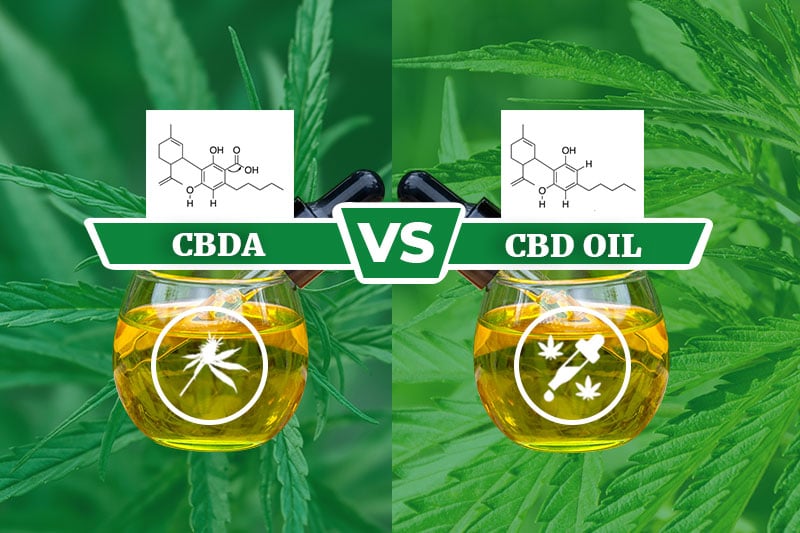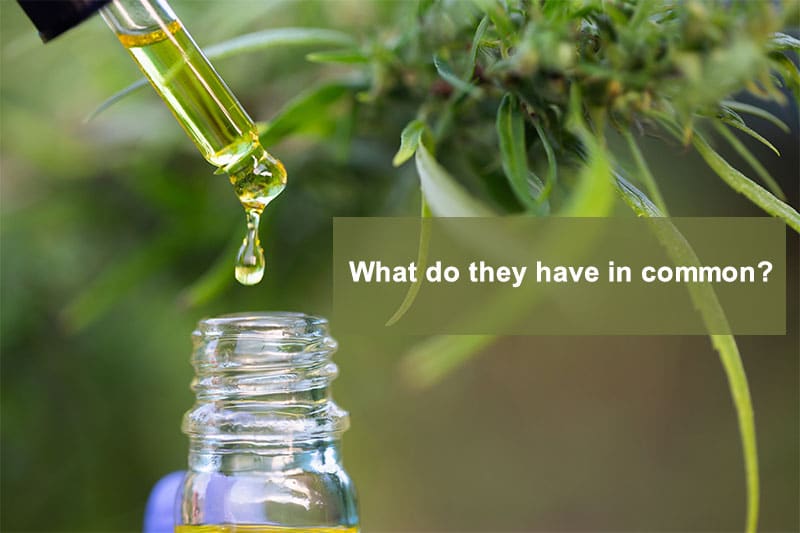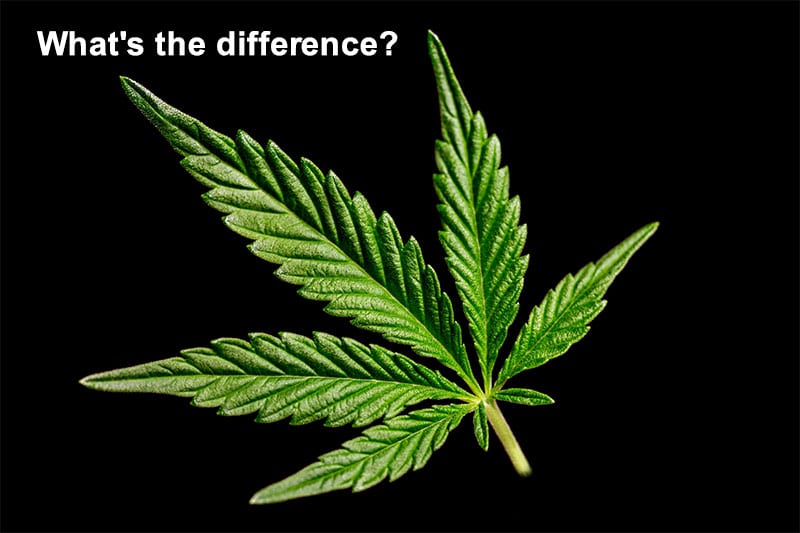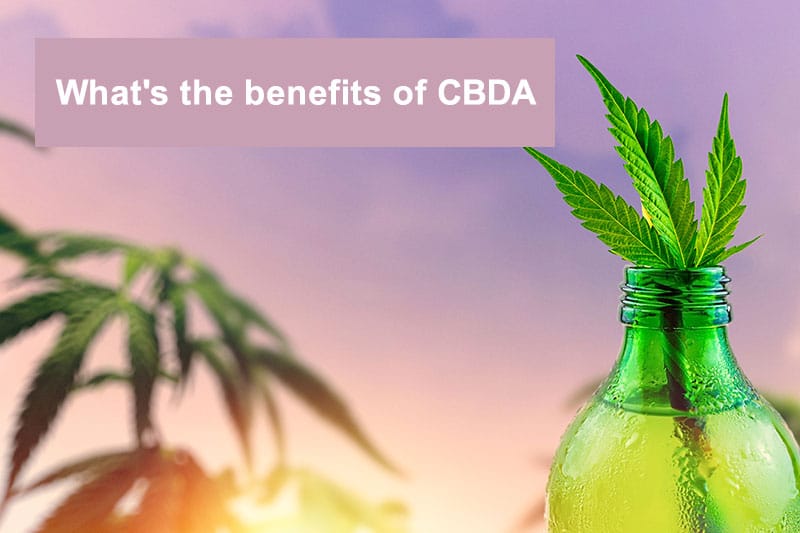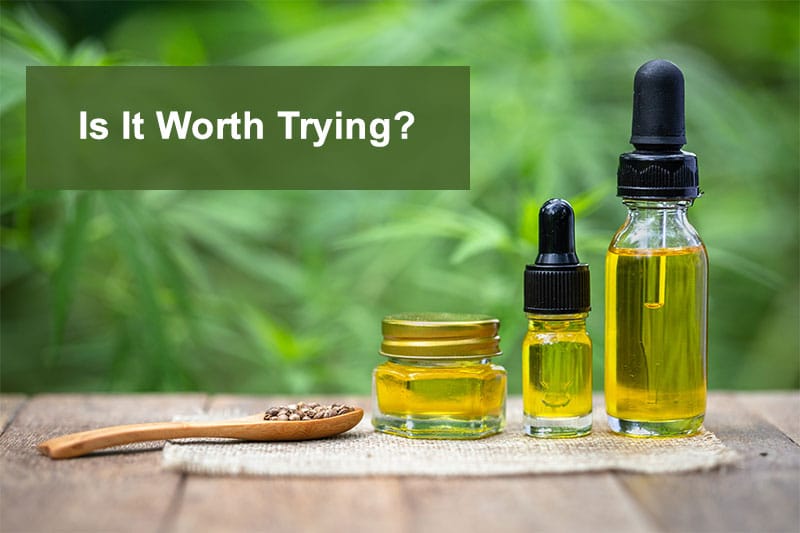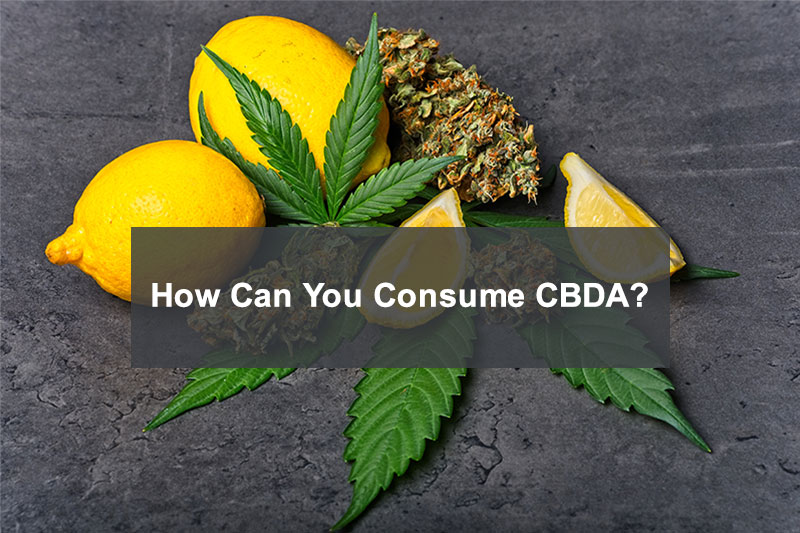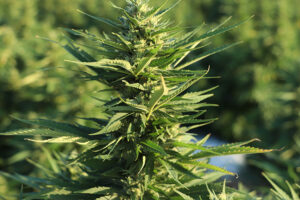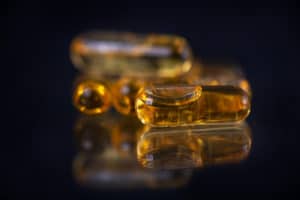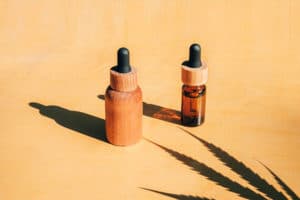We are slowly getting to know the cannabis plant and its cannabinoids like CBD, THC, CBG, and so on. The popularity of this plant has led researchers to dig deeper into what exactly cannabis contains. Although most of us are familiar with CBD and THC, there is one cannabinoid becoming quite popular—CBDA.
CBDA is one of the main cannabinoids produced in the flowers, stems, and leaves of cannabis plants such as hemp, Sativa, and Indica.
It sounds confusing, right? Is CBDA better than CBD? What is the difference between CBD and CBDA? Should you choose a CBD oil that contains CBDA?
Keep reading, and you’ll find out everything you need to know.
CBDA Explained: What Is It and How Does it Affect Your Body?
CBDA stands for cannabidiol acid. Some people know it as the acid precursor to cannabidiol (CBD). When the cannabis plant grows, it produces THCA and CBDA, not THC or CBD. In their acidic form, both THCA and CBDA are inactive. However, when you heat CBDA, a decarboxylation reaction occurs, which turns the acid into pure CBD.
In scientific terms, decarboxylation is a chemical reaction that slowly breaks a carboxyl group (two oxygen, one hydrogen, and one carbon atom or COOH). When you expose the carboxyl group to high temperatures, the group breaks up to form hydrogen and carbon dioxide, leaving pure CBD.
Research into how CBD and CBDA affect our bodies is still in its early stages. Neither creates a “stoned effect” because cannabinoids don’t interact with our endocannabinoid system. CBDA causes some effects by activating serotonin receptors or 5-HT1A.
Serotonin receptors are found in the brain and are responsible for regulating sleep, anxiety, and mood. This activation of serotonin receptors has led researchers to investigate CBDA as an anti-nausea medicine. Many experts believe that CBDA is even more effective at reducing sickness and nausea than CBD.
What Do CBD and CBDA Have in Common?
Before we reveal the differences between CBDA vs. CBD and discuss the potential benefits of CBDA, it is vital to understand the relationship between these two cannabinoids.
Both CBD and CBDA develop in cannabis as CBGA cannabinoids. Once the plant starts producing enzymes, CBDA converts CBGA into CBD. From here, CBD is produced from CBDA by the process of decarboxylation. The process can happen more slowly or instantly (depending on the plant).
Like CBD, CBDA is also a potent anti-inflammatory drug, fighting the main inflammatory enzymes—COX-1 and COX-2. There is a connection between the two enzymes and inflammation after an infection or injury. According to researchers, CBDA can reduce pain and inflammation by interfering with these enzymes.
What Is The Difference Between CBDA and CBD?
Although the chemical structures of CBD and CBDA are similar, there are a few differences between these two cannabinoids you should know.
One of the main differences is that CBDA contains a COOH chemical group called a carboxyl group. Decarboxylation removes the carboxyl group, leaving CBD. Most research has shown that CBD is more active than CBDA, which is why it is more prevalent in medicine.
However, CBDA is not inactive. While there are multiple studies on CBD and its benefits, scientific research on CBDA is not comprehensive. When compared, CBD has the advantage, but that doesn’t mean that CBDA is less effective.
Let’s see what we know about CBDA benefits and its potential healing properties.
CBDA Benefits: The Available Research on CBDA
Besides the scientifically proven CBD health benefits, experts believe CBDA has the same (if not more) healing properties, including antibiotic, antibacterial, anti-inflammatory, and anti-proliferative effects.
Suppresses Breast Cancer Cells
CBDA cannabinoids are raising hope for numerous medical conditions. One such condition is cancer. Studies by Takeda revealed that CBDA had the potential to suppress the growth of cancer cells, specifically breast cancer cells, and prevent them from spreading.
According to the researchers, exposing breast cancer cells to CBDA for 48 hours reduced the COX-2 enzyme, which is part of the inflammatory process. COX-2 or cyclooxygenase-2 plays a crucial role in 40% of invasive breast cancers.
Scientists believe that the spread of cancer cells throughout the body (a process known as metastasis) is responsible for breast cancer-related deaths. Thus, the discovery of CBDA’s effects on COX-2 could prove essential in improving the prognosis of patients fighting this life-threatening disease.
Reduces Nausea and Vomiting
Although CBDA is pharmacologically inactive, researchers found that it has potent effects against nausea and vomiting. According to one study from 2013, CBDA can reduce the symptoms of nausea and improve 5-HT1A receptor activation at the same time.
The results were encouraging – “CBDA displays significantly greater potency at inhibiting vomiting in shrews and nausea in rats, and at enhancing 5-HT1A receptor activation, an action that accounts for its ability to attenuate conditioned gaping in rats.”
More studies are necessary to confirm the effects of CBDA on nausea in humans. However, this study gives us hope that CBDA treatment can relieve these symptoms.
Relieves Pain
Since CBDA helps decrease the effect of COX-2 and its inflammatory properties, it is popular in the medical industry (much like its cannabinoid friend CBD). Doctors prescribe CBD and CBDA oil for treating chronic pain conditions such as arthritis.
Many research studies have documented CBDA’s anti-inflammatory properties. One study proved that CBDA was more effective than THC at decreasing the expression of the COX-2 enzyme. According to the research, the carboxylic acid group on CBDA is crucial for blocking the COX-2 enzyme.
Works as an Antidepressant
Another benefit of CBDA is its high antidepressant effects. Although the role of CBDA in treating depression and anxiety are in preclinical stages, researchers are optimistic that CBDA has more substantial antidepressant effects than THC and CBD.
Scientists have also found that CBDA has an affection for serotonin receptors, therefore, improving mood and causing happy emotions.
Prevents Seizures
CBDA’s serotonin receptors are directly involved in the control of brain seizures, specifically epilepsy. CBDA has an affection for 5-HT receptors and uses the mechanism to provide anticonvulsive advantages.
“Compared with THC, cannabidiol shows a better defined anticonvulsant profile in animal models and is largely devoid of adverse psychoactive effects and abuse liability. Over the years, this has led to the increasing use of CBD-enriched extracts in seizure disorders, particularly in children.”
CBDA health benefits are promising, but more clinical trials and analyses are required to validate these findings.
Lowers Stress and Anxiety
Although there is no official evidence to support the fact that CBDA is good for mental wellbeing, some medical experts have implied that the cannabinoid could help treat anxiety, pressure, and stress.
Despite any shortcomings in analysis and research, it is clear that CBDA displays different health benefits from CBD. Still, both CBD and CBDA maintain a close relationship that requires more experimentation and exploration.
Is CBDA Worth Trying?
Like CBDA, CBDA is not intoxicating, meaning you won’t get high. However, it may have potential anti-proliferative, anti-inflammatory, and antibacterial properties.
Scientists are actively working on finding evidence that CBDA reduces stress, nausea, anxiety, and tumor proliferation, among other effects. These reasons indicate that CBDA deserves further research as a medical drug.
How Can You Consume CBDA?
CBDA is a component of cannabis plants, but once it is processed, it loses its COOH group and becomes CBD. The good thing is that you can find this cannabinoid in the leaves, stems, and flowers of cannabis.
You can ingest CBDA in any form—adding to a salad, blending with fruit juice, putting in your dessert, and so on. Sometimes, it can be a little bitter, so if you are into more sugary things, add sweetener. You can also find CBDA in oils, topicals, sublingual drops, capsules, and syrups.
The Future of CBDA: Final Words
Although CBDA and CBD don’t share the same popularity, they have a lot of properties beneficial to our wellbeing and mental health. We are just starting to learn about CBDA, and researchers are beginning to discover its potential for conditions such as nausea and vomiting, depression, breast cancer, epilepsy, and arthritis. Furthermore, CBDA may have unrealized beneficial effects awaiting discovery.
If you are interested in exploring the health effects of CBDA, know that you can only find this cannabinoid in raw cannabis and that you can destroy its features by baking or smoking it, so choose a different way to consume it.
When it comes to the future of CBDA, we expect to hear more good news. Medical experts have only been researching the possible health effects of CBDA for a short time, and there is much to grasp about this cannabinoid acid. We are optimistic and believe that just like CBD, CBDA will offer plenty of benefits.
FAQ’s About The Benefits of CBDA
Question: Is CBDA better than CBD?
Answer: As of now there is still no concrete proof that CBDA is better than CBD, although there are claims that CBDA is more potent than CBD
Question: Can CBDA also function as a potent anti-inflammatory drug?
Answer: Yes. Like CBD, CBDA can be also a potent anti-inflammatory drug
Question: Whats the difference between CBDA and CBD?
Answer: One of the main differences is that CBDA contains a COOH chemical group called a carboxyl group. Decarboxylation removes the carboxyl group and thus leaving only CBD
Question: What is the benefits of CBDA?
Answer: Some of the benefits of CBDA include reduce nausea and vomiting, relieves pain, an anti-depressant, and lower stress and anxiety.
Question: Will you get high in trying CBDA?
Answer: Like CBD, CBDA is not intoxicating meaning you wont get high.
Question: How can you consume CBDA?
Answer: You can ingest CBDA in any form. Some add them in the salad, or blend it with some fruit juice. There are also CBDA oils, topicals, capsules, etc in the market
Feel free to steal this image for your own site. All we ask is for proper attribution.
